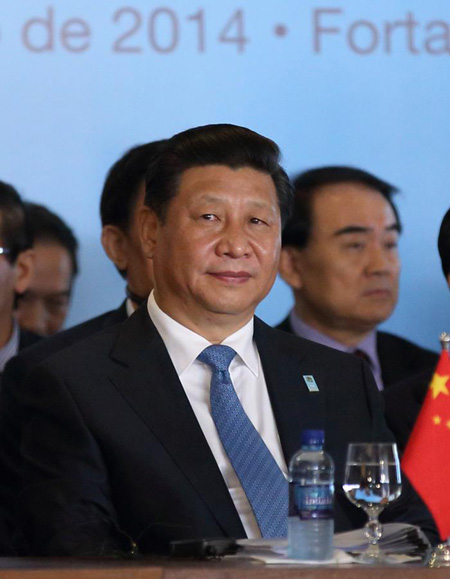 Ceremony volunteers for Youth Olympics make public appearance
Ceremony volunteers for Youth Olympics make public appearance
 A glimpse of female crew of Liaoning aircraft carrier
A glimpse of female crew of Liaoning aircraft carrier
 Stills from "Dad, where are we going?"
Stills from "Dad, where are we going?"
 Legless man's happy life
Legless man's happy life
 Top ten most beautiful islands in China
Top ten most beautiful islands in China
 Aerial view of Hong Kong
Aerial view of Hong Kong
 Happy life in Xinjiang
Happy life in Xinjiang
 2014 China Hainan Int'l Automotive Exhibition kicks off
2014 China Hainan Int'l Automotive Exhibition kicks off
 Collection of 'China Dream' public-spirited ads
Collection of 'China Dream' public-spirited ads
 The silent holy stones
The silent holy stones

Chinese President Xi Jinping attends a dialogue between BRICS countries' leaders and presidents from 11 South American nations, in Brasilia, Brazil, July 16, 2014. [Photo/Xinhua]
President Xi Jinping called for respect of all countries’ cyberspace sovereignty on Wednesday, telling the Brazilian congress that “there are no double standards in the information sector, and every country has the right to preserve its own information security".
Xi’s remarks were made amid continuing revelations about extensive spying by the United States on other countries, including China, Brazil and Russia, and even some US allies.
During the 30-minute speech, Xi said the Internet’s rapid development poses new challenges to the sovereignty, security and interests of a country, and should be handled seriously.
Although the Internet is highly globalized, the sovereignty of the information of all countries should be respected, Xi said.
"No matter how developed a country’s Internet technology is, it must not violate the information sovereignty of others”.
Xi called for the establishment of a joint international system of governance to achieve a peaceful, secure and open cyberspace. Such a system should feature multilateral cooperation, democracy and transparency, he said.
The statement was part of a broader message in which Xi emphasized that China and Brazil should take on more international responsibility as major emerging economies.
Brazilian President Dilma Rousseff canceled a planned state visit to the US last year after documents provided by former US intelligence contractor Edward Snowden revealed that the US National Security Agency had intercepted her personal e-mails and targeted the communications of Petrobras, the Brazilian state oil company.
Rousseff sponsored a debate about online spying at the UN General Assembly that ended in December with the adoption of a resolution reaffi rming the right to Internet privacy.
In the just-concluded BRICS summit of leaders from Brazil, Russia,India, China and South Africa, a joint declaration issued on Tuesday said the five countries agreed that “it is necessary to preserve information and communication technologies, particularly the Internet, as an instrument of peace and development and to prevent its use as a weapon.”
Joao Nogueira, former president of the Institute of International Relations of Pontificia Universidade Catolica do Rio de Janeiro, said, “It is a very important moment for President Xi Jinping to mention this issue in the BRICS summit because it can help to push the situation ahead. And Brazil is in line with China’s stand.’’
Nogueira said it is important to build a more multilateral governance of the Internet, such as introducing the UN into the system.
Highlights
President Xi Jinping’s proposals for advancing China-Brazil ties in his speech at the Brazilian congress:
Strategic cooperation
China and Brazil should make continued efforts to deepen strategic mutual trust.
They should understand and support each other on major issues concerning the other’s core interests, such as sovereignty, security and territorial integrity.
They also should firmly support each other to adhere to a development path in line with our own national conditions.
They should strengthen strategic dialogue and exchange experience in governance.
Economic development
Both should highlight their common development by enhancing coordination on macroeconomic policies and expanding strategic converging points.
They also should speed up the implementation of the 10-year cooperation plan.
They should expand trade scale and mutual investment and properly handle trade frictions.
They should push forward a batch of strategic cooperation projects to promote deeper and broader practical cooperation.
International affairs
They should jointly safeguard and promote international justice and uphold the principles and tenets of the UN Charter.
They should establish a new pattern of global development partnership that is more equal and balanced.
They should strengthen coordination within the international and multilateral mechanisms, including the UN, World Trade Organization, G20 and BRICS.
They should actively participate in global governance, and strive for more institutional power and rights to speak for developing countries.
 Moms on their kid’s coming out
Moms on their kid’s coming out Chinese fighters through lens
Chinese fighters through lens
 Children attend gymnastics training in summer
Children attend gymnastics training in summer
 Beautiful sceneries along the special travel route in Xinjiang
Beautiful sceneries along the special travel route in Xinjiang
 Beauty SWAT member in Xinjiang sparks online frenzy
Beauty SWAT member in Xinjiang sparks online frenzy
 Germany beat Argentina 1-0 to win World Cup
Germany beat Argentina 1-0 to win World Cup
 National fitness team members integrate traditional and modern beauty
National fitness team members integrate traditional and modern beauty Collection of 'China Dream' public-spirited ads
Collection of 'China Dream' public-spirited ads  How Chinese men kill the time when their wives practice square dancing?
How Chinese men kill the time when their wives practice square dancing? Top 10 most beautiful islands in China
Top 10 most beautiful islands in China
 Zhou Xun announces engagement to Archie Gao
Zhou Xun announces engagement to Archie Gao
 Photos of the Week
(July 6 - July 12)
Photos of the Week
(July 6 - July 12)
 'Super moon' seen in Beijing
'Super moon' seen in Beijing
 One-legged women with high heel goes viral on Internet
One-legged women with high heel goes viral on Internet China's largest 3D printer builds 2-meter-long boat
China's largest 3D printer builds 2-meter-long boat
Day|Week|Month